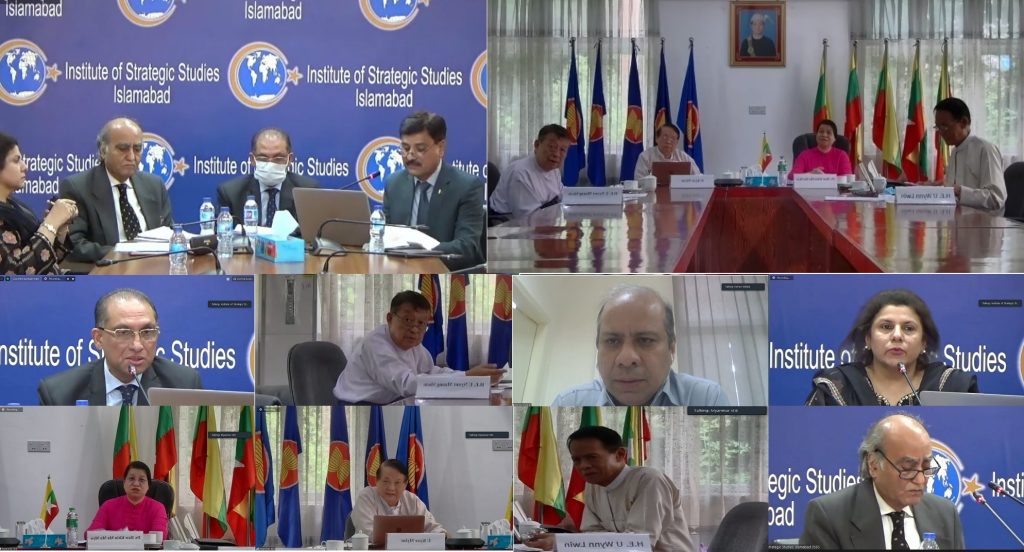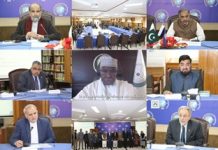Press Release
STRATEGIC VIRTUAL DIALOGUE
“Challenges to Peace and Security in South Asia”
Institute of Strategic Studies Islamabad (ISSI) and Myanmar Institute of Strategic& International Studies (MISIS)

The India Study Centre (ISC) at the Institute of Strategic Studies, Islamabad (ISSI) organized a Strategic Virtual Dialogue with Myanmar Institute of Strategic & International Studies (MISIS) on “Challenges to Peace and Security in South Asia” on October 14, 2020. The speakers at the dialogue were Ambassador U Nyunt Maung Shein, Chairman, MISIS. Ambassador Aizaz Ahmad Chaudhry, DG, ISSI, Dr. Farhan Hanif Siddiqi , Director School of Politics and IR, Quaid- i- Azam University. Dr. Daw Khin Ma Ma Myo, Professor of IR Dept at University of Yangon. Dr. Shabana Fayaz, Chairperson , Dept of Def & Strategic Studies, Quaid- i- Azam University, Islamabad and ‘ U Kyee Myint, Research Fellow, MISIS.
In his introductory remarks, the Director ISC Dr. Saif Malik said that the virtual dialogue of ISSI and (MISIS) was very important to understand geo-political and geo-economics situation of the region. He further reiterated that South Asian region which is the most densely populated region of the world is currently, confronted with diverse challenges. He viewed that the region had a great potential providing massive opportunities in shape of BRI and CPEC. However, India remains a great hurdle in progress of the region by showing its aggressive posture to perpetuate its hegemony.
While, welcoming the guests, the Director General (ISSI) Ambassador Aizaz Ahmad Chaudhary highlighted the significance two themes such as India Pacific and CPEC. He said that region had been undergoing a rapid change due to great power competition of the US and China. He maintained that the trend of unilateralism to impose ideas on others also poses a grave threat to region. The US likes to maintain its hegemony while China desires to create economic opportunities believing in win-win situation. Lastly, he said that Pakistan never wanted the conflict of the US and China and wished to get maximum benefits from CPEC.
Ambassador U Nyunt Maung Shein, Chairman, MISIS in his opening remarks extended gratitude to the ISSI and underscored the bilateral relations of Pakistan and Myanmar as both countries witnessed a couple of visits of armed forces from both sides. Pakistan’s former President Asif Ali Zardari paid a visit to Myanmar in 2012 and Prime Minister of Pakistan Nawaz Sharif in 2013 also visited Myanmar that shows seriousness of both states in bolstering of bilateral ties. He said MISIS was looking forward to reviving the MOUs signed earlier.
Dr. Farhan Hanif Siddiqi , Director School of Politics and IR, Quaid- i- Azam University, Islamabad shared his views on “Pakistan’s Perspective on Indo Pacific” and articulated that Pakistan certainly had been facing challenges in global power competition. He highlighted the salient features of Indo-Pacific report that perceives China as a revisionist state. Though China is a leading trade partner of the US having nearly annual trade of USD 650 billion. Nevertheless, it is reckoned as a revisionist state. He raised some questions about the position of Pakistan in great power competition of the US and China and accentuated that Pakistan had to remain neutral.
Dr. Daw Khin Ma Ma Myo, Professor of IR Dept at University of Yangon spoke on ‘Myanmar’sPerspective on Indo Pacific’saidthat great power competition of the US and China by and large had implications for Indo-pacific security. She stressed that Myanmar was very important country for both India and China as it is a gateway to South Asia and South East Asia. Thus, the country’s significance grows for regional states. Myanmar is also blessed with natural gas and useful labour force. Most importantly, she said that Myanmar is a member of ASEAN and has observer status in SAARC.
Dr. Shabana Fayaz,Chairperson , Dept of Defence and Strategic Studies, Quaid- i- Azam University, Islamabad shared her perspective on ‘China Pakistan Economic Corridor ( CPEC) – Harbinger of Regional Connectivity’.Shehighlighted the role of Pakistanfor regional connectivity via CPEC and said that CPEC was a great concern for the US and India. Pakistan has extended its support to India to become a part of CPEC. She said that CPEC would provide an easy access to India to reach Central Asian States and GCC countries. CPEC, also provides a great opportunity to war-torn Afghanistan to be connected in the region.
U Kyee Myint,former Deputy Director General expressed his views on ‘ Belt and Road Initiative with China-Myanmar Economic Corridor’and underscored China- Myanmar Economic Corridor CMEC. He said that Myanmar was very important of both China and India connecting South Asia with South East Asia. He viewed that BRI and CMEC would pave the way for economic opportunities and regional prosperity. Special Economic Zones in Myanmar now provides an easy access of Indian Ocean to China.
The dialogue was later followed by Interactive Session/Q & A. A number of questions were raised by the participants particularly from the India Study Centre for regional peace, stability and prosperity.
While concluding the event, Chairman Board of Governors ISSI Ambassador Khalid Mehmood said South Asia by virtue of its size, population and unresolved disputed territorial issues had been facing many challenges. The situation is further exacerbating by RSS imposing Hindutva ideology that causes problems for minorities. However, he maintained that the only silver lining in the region was BRI and CPEC heralding the path of development and prosperity. He in concluding remarks suggested that peaceful means ought to be utilized to resolve Kashmir issue.











